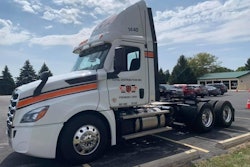Given the complexity of today’s trucking environment, moving to dedicated contract carriage makes sense for many fleets. However, before making the decision, it is important to carefully vet potential dedicated contract carriers to ensure they will be a good fit for you.
Here are some important areas you need to explore during your search:
1. Financial viability: You need to have confidence that they have the financial strength to purchase new vehicles and to invest in needed technology.
2. Longevity: How long have they been in business? You want to partner with someone that has experienced the ups-and-downs of trucking and knows how to navigate through trying times.
3. OEM connections: Ask about their relationships with various truck manufacturers. This can be very important especially during times of allocation of new assets from manufacturers.
4. Fleet optimization: What is the process they use to make sure you have not only the right number of trucks but also the right kinds of trucks? What is involved in their analysis of your fleet and its equipment needs so that you can continue to provide the same level of service to your customers?
5. Technology investments: This encompasses everything from telematics to routing, driver interface to maintenance management and reporting capabilities. The dedicated contract carrier should be using various technologies as tools to improve operating efficiency.
6. Driver availability: What are they doing to attract and retain skilled drivers? What is their process for supplying backup drivers in the event the regular driver is unavailable?
7. On-time delivery: Ask a potential provider what their on-time delivery percentage is? You want every load to arrive at your customer’s location on time. What is the provider going to do to get as close to 100% on-time delivery as possible?
8. Safety rating: Ask questions about their driver safety training programs and investigate their CSA scores. You want to partner with a dedicated contract carrier that is focused not only on on-time deliveries but also on safety. This includes asking about what safety equipment is spec’d on their vehicles.
9. Flexibility: Does the company have the ability to respond to peak or seasonal demands with additional equipment and drivers?
10. Visibility: What transportation management system are they using? Are you able to have real-time visibility into where your loads are?
11. Tailored/customized solutions: Your business is unique, and you need a dedicated contract carrier that recognizes that uniqueness and can structure a plan that addresses your unique needs. Avoid companies that provide cookie-cutter solutions.
The goal when moving to a dedicated contract carrier is to improve your overall efficiency. By asking a few simple questions, you will find the carrier that is right for you.












